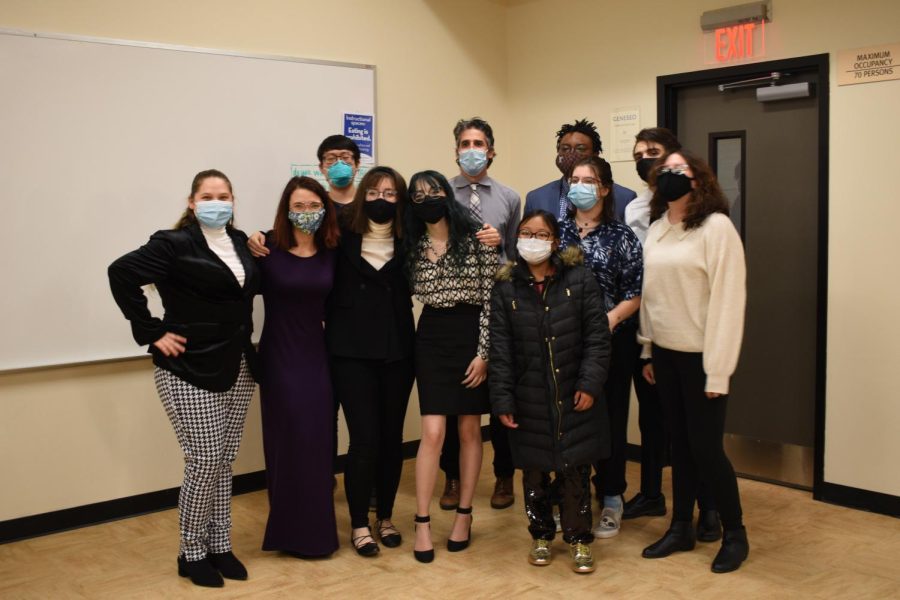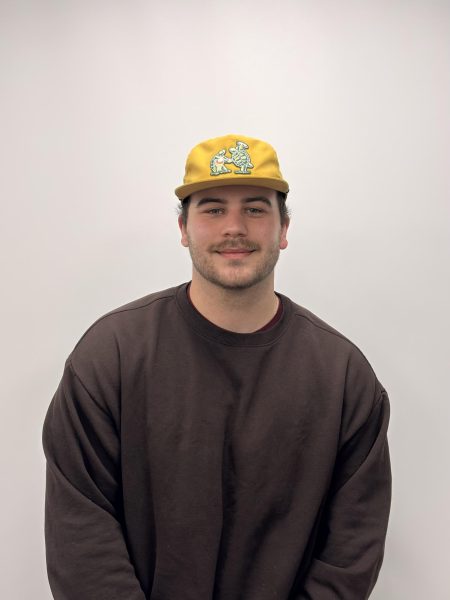SUNY Buffalo State College’s mock trial team shares what they loved most about returning to in person competition
SUNY Buffalo State College Mock Trial Team (left to right) Dominique Zirpola, Grace Gallagher, Vincent Bai, Lindsey Roth, Madeline Crosby, David Ben-Merre, Cait Malilay, Jerick Flores, Mimi Byrne, John Quinane and Jillian Tung
November 24, 2021
Buffalo State College’s mock trial team shared what it was like competing for the first time in person at the Third Annual Geneseo Joust on Nov. 20 and 21 since the COVID-19 pandemic.
The whole team, coached by David Ben-Merre, an English professor, was so happy to be back in person.
“This year, it’s been great to be back in person and be able to compete safely,” he said in an email.
Ben-Merre, who began coaching mock trial in 2008, said that although it was fun to be able to compete last year over Zoom, it felt like something important was missing.
Vincent Bai, a University of Arizona graduate and mentor who helps coach the English-389 class, said that he judged a few competitions virtually, but observing online, he could tell that it comes with its challenges in conveying a story.
“There are just so many things that go into creating a compelling narrative: movement, hand motions, eye contact, volume, tone and these are all almost completely lost through Zoom,” he said.
Bai had the opportunity to be a judge at the tournament.
“From an outside perspective, it’s so amazing watching all these students who have put in so much time and effort into perfecting their roles. You can really tell how hard they work and how much they want to improve,” Bai said. “From a coaching perspective, it’s so valuable being able to see different perspectives and different takes on the same basic set of facts.”
Dominique Zirpola, a student majoring in criminal justice and minoring in sociology of deviance who played a prosecution attorney and a witness, said that returning in person was a bit stressful and there’s more pressure to perform well, but was glad to return.
“Overall, I was still excited to get the old feeling I had back. There is a certain sense of accomplishment you get when competing in person and I was happy to have that,” she said. “It was also nice to feel the in person chemistry I had with the team.”
Jerick Flores, a criminal justice major who played an attorney, said that what he enjoyed most were the objection battles.
“When I think I raised a good argument but the opposing counsel [raised] an argument to counter what I said, I really [had] to make something cohesive up on the spot so that the judge [allowed] the information I [wanted],” he said. “Nobody really wins or loses an objection battle but the flow of an opposing counsel’s direct or cross examination can easily be disrupted because of a well argued objection. Putting myself in situations where I have to come up with a response under a lot of pressure, really helps with improving my communication skills.”
Jillian Tung, a student majoring in chemistry and minoring in legal studies who played a witness, said that this was her first time competing and she loves being a part of a team.
“It was great to see everyone in action and very satisfying to see everything come together. I love performing on teams and I love performing with these people especially,” she said. “I’ve made a lot of friends through mock trial, both in the freshman honors class and the competitive team. It’s nice to know that these people have your back and want you to succeed as much as you want them to also.”
Mock trial is beneficial for anyone regardless of major.
“I was a biochemistry major, and I joined mock trial just for the sake of improving my public speaking & communication skills,” Bai said. “Learning how to convey a cohesive and compelling narrative to a group of ordinary people is something that’s transferrable and relevant to any field.”
Ben-Merre said that former students of his shared how it was “one of the most influential and formative parts of their time at college.”
One of the things that mock trial teaches is how the U.S. justice system works and basic legal procedures.
It is also beneficial in learning presentation, practicing critical thinking, analytical skills, teamwork, and having opportunities to compete with those who hold similar interests across the country and networking with legal professionals in the Western New York area.
“Despite how stressful the trials and the practice may get, mock trial is a place where you can improve all aspects of social communication,” Flores said.
Tung said that if one is interested in joining mock trial, they should “go for it!”
“You might learn that you really like performing a character, or that you enjoy the rhetoric that comes with being an attorney. It can get stressful at times, but everyone has your back,” she said.
There may be no assigned textbooks in the mock trial team class, but it still requires dedication.
“Be prepared to work hard and fully commit. You will be pushed to get better and better, but you will grow from the experience. More importantly, you will make memories that will last forever,” Zirpola said.
If you’re interested in joining mock trial, email any questions to Ben-Merre at [email protected].
This article is also featured on typeawaycait.blogspot.com!




